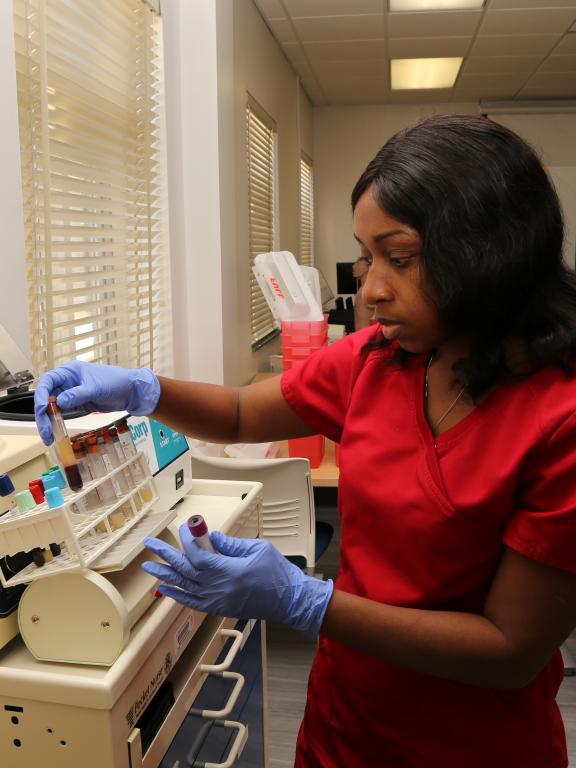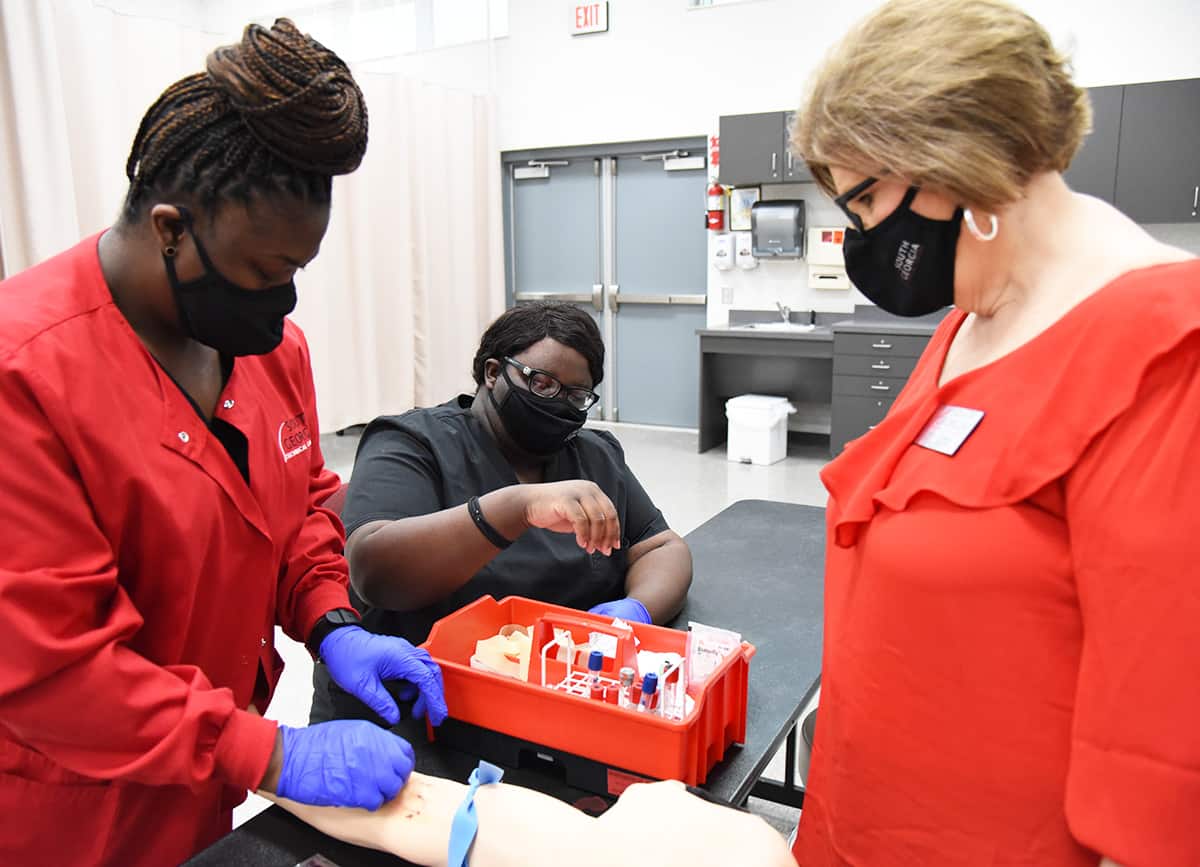Phlebotomy school FAQs: Everything Beginners Ask
Phlebotomy school FAQs: Everything Beginners Ask
Blog Article
The Course to Accreditation: Understanding the Phlebotomy Educating Course Journey and Its Importance
As you take into consideration the course to accreditation in phlebotomy, it's essential to recognize the role you'll play in healthcare. Your training will certainly cover necessary abilities, from blood collection techniques to patient communication.

The Role of Phlebotomists in Health Care
Phlebotomists play an essential function in the healthcare system, working as the vital link in between individuals and necessary analysis screening. You'll carry out blood attracts, making certain examples are collected precisely and safely. Your know-how helps in identifying clinical problems, keeping track of wellness, and guiding treatment choices.
In your day-to-day communications, you'll require to establish trust with individuals, making them really feel comfortable during what may be a difficult experience. You are in charge of labeling and managing samples meticulously to stop contamination or mistakes, which can affect test outcomes.
Yet, you'll often function together with physicians and nurses, communicating vital info about patients' conditions. Your role is fundamental in maintaining the workflow in healthcare setups, ensuring prompt and accurate results. By understanding your skills, you contribute meaningfully to patient treatment, making you an essential component of the medical team. Embracing this obligation is vital to your success as a phlebotomist.
Introduction of Phlebotomy Training Programs
When checking out phlebotomy training programs, you'll locate various kinds created to fit different schedules and learning designs. Each program helps you create important skills like blood collection and client communication. Understanding these alternatives is key to choosing the right course for your career.
Sorts Of Educating Programs
A number of kinds of training programs are available for those aiming to become skilled in phlebotomy. You can choose from certificate programs, which commonly last a few months and concentrate on essential abilities. There are also diploma programs that supply a more detailed education, commonly lasting as much as a year. If you're looking for a deeper understanding, an associate degree in an associated field might be the ideal fit. Online programs provide adaptability for those balancing work or household dedications, permitting you to research at your own pace. Furthermore, some hospitals and facilities use on-the-job training programs, providing sensible experience while you learn. Whatever path you choose, each program aims to outfit you with the needed abilities for an effective phlebotomy profession.

Secret Skills Established
Grasping phlebotomy needs a collection of essential abilities that are established through complete training programs. Furthermore, communication skills are basic; you'll need to connect with clients, clarify treatments, and put them at simplicity. Each of these abilities is necessary for your success as a certified phlebotomist, making you a beneficial property in any type of healthcare setting.
Key Elements of a Phlebotomy Course
In a phlebotomy course, you'll concentrate on important subjects that prepared for your future profession. You'll participate in hands-on training that permits you to use what you've discovered in real-world settings. Both the core curriculum and functional experience are crucial for your success as a phlebotomist.
Core Educational Program Introduction
While pursuing a phlebotomy training course, you'll run into a curriculum developed to equip you with fundamental abilities and expertise. Phlebotomy Classes Near Me. This educational program usually includes composition and physiology, concentrating on the blood circulation system and recognizing blood parts. You'll likewise find out about various kinds of blood collection approaches, including venipuncture and capillary leak strategies
Furthermore, infection control and safety and security procedures are vital components, guaranteeing you recognize just how to maintain a sterile atmosphere. You'll research patient communication, stressing interaction and empathy, which are important for easing individual anxiety. Finally, ethical and lawful considerations will certainly be addressed, preparing you for real-world obligations. This foundational knowledge will allow you to excel as a phlebotomist and supply high quality treatment in clinical setups.
Hands-On Training Experience
Obtaining hands-on experience try here is an indispensable part of your phlebotomy training course. This functional training allows you to use what you've found out in a real-world setup, boosting your skills and self-confidence. You'll exercise venipuncture strategies, learn exactly how to deal with various kinds of specimens, and obtain familiar with the devices utilized in the area. Under the advice of skilled instructors, you'll refine your skills, guaranteeing you're prepared for any type of situation you may deal with.
In addition, you'll get the opportunity to interact with patients, which is necessary for creating your communication abilities. This mix of technical efficiency and interpersonal skills is critical for your success as a licensed phlebotomist. Eventually, hands-on training is where theory satisfies technique, solidifying your understanding and readiness for qualification.
Certification and Licensing Demands
Prior to you can start your job in phlebotomy, it is essential to recognize the qualification and licensing demands that vary by state. The majority of states need phlebotomists to hold a qualification from an identified organization, such as the National Phlebotomy Association or the American Society for Medical Pathology. These accreditations generally involve passing a test that evaluates your understanding and skills in the field.
Along with accreditation, some states have certain licensing demands. You may require to finish a certain variety of hours in medical technique, submit evidence of training, or go through a background check. It is essential to investigate your state's laws to ensure you satisfy all necessary click this site standards.
Remaining notified concerning these needs not only aids you safeguard a placement however also enhances your trustworthiness as a professional. By meeting these needs, you'll be well on your method to a successful career in phlebotomy.
Hands-On Training and Practical Experience
Hands-on training and functional experience are necessary elements of your phlebotomy education, as they allow you to apply theoretical understanding in real-world scenarios. During your training, you'll participate in monitored venipuncture, learn proper methods, and become aware of numerous blood collection equipment. This straight involvement is critical for building your self-confidence and sharpening your skills.
You'll function very closely with experienced specialists who can direct you with the nuances of individual interaction and example handling. Each method session not just enhances Our site your understanding yet additionally prepares you for the fast-paced setting of healthcare setups.
Additionally, many programs include medical rotations, permitting you to experience diverse setups, from medical facilities to outpatient clinics. This exposure helps you adjust to various obstacles and patient demands, guaranteeing you're well-prepared for your future function. Welcome these opportunities, as they're important to coming to be a skilled and compassionate phlebotomist.
Difficulties Dealt With During Training
While obtaining hands-on experience is crucial, it's vital to acknowledge the obstacles that can occur during your phlebotomy training. In addition, understanding the abilities required for blood draws takes technique; you may battle with strategy at first.
Time monitoring can likewise be a hurdle, as balancing concept, functional sessions, and individual dedications can really feel challenging. You might deal with varying learning speeds amongst your peers, leading to feelings of self-doubt if you think you're falling back. Lastly, adjusting to the different characters of trainers can be challenging, as each might have a special teaching design.
Recognizing these obstacles at an early stage can prepare you for success and help you create resilience throughout your training trip.
Profession Opportunities After Accreditation

As you acquire experience, you might even consider focusing on areas like pediatric or senior citizen phlebotomy, providing to particular patient demands. Some phlebotomists choose to advance their careers by coming to be lab service technicians or going after more education in medical care fields.
Furthermore, your certification can bring about functions in training or managing brand-new phlebotomists, permitting you to share your expertise. With the health care market consistently growing, your abilities will certainly constantly remain in demand, leading the way for a stable and meeting occupation. Welcome the chances waiting on you!
Frequently Asked Concerns
What Is the Common Duration of a Phlebotomy Training Program?
Phlebotomy training courses generally last around four to 8 weeks. You'll take part in hands-on method, classroom direction, and on the internet understanding. Finishing this training prepares you for qualification and a fulfilling career in healthcare.
Are Online Phlebotomy Courses Available?
Yes, online phlebotomy courses are readily available. They use adaptability and convenience, allowing you to research at your own rate. Simply confirm the program is approved to meet accreditation demands and gain beneficial skills for your occupation.
Just How Much Does Phlebotomy Training Commonly Price?
Phlebotomy training typically sets you back in between $700 and $2,500, depending upon the program and place. You need to consider factors like program size, consisted of materials, and hands-on experience when selecting the appropriate training for you.
What Are Common Requirements for Phlebotomy Training?
Typical prerequisites for phlebotomy training commonly consist of a senior high school diploma or GED, immunizations, and a history check. Some programs might also need fundamental healthcare understanding or qualifications, guaranteeing you're prepared for hands-on training.
Can I Function While Completing My Phlebotomy Training?
Yes, you can work while completing your phlebotomy training. Many students balance tasks with their research studies, however ensure to manage your time efficiently to ensure you satisfy both work and training commitments effectively.
Report this page